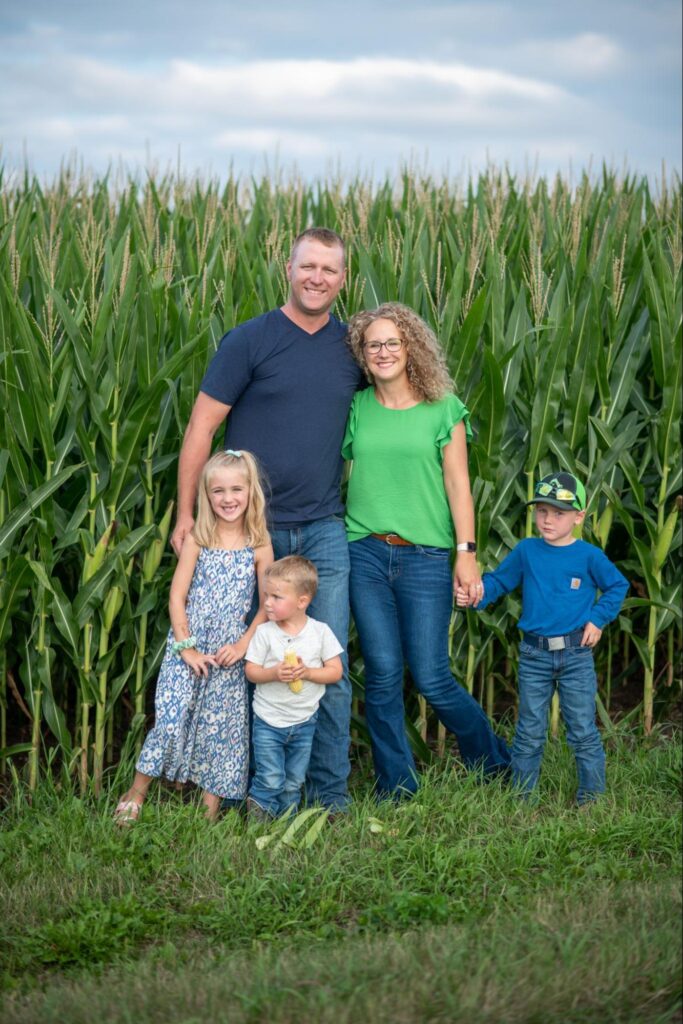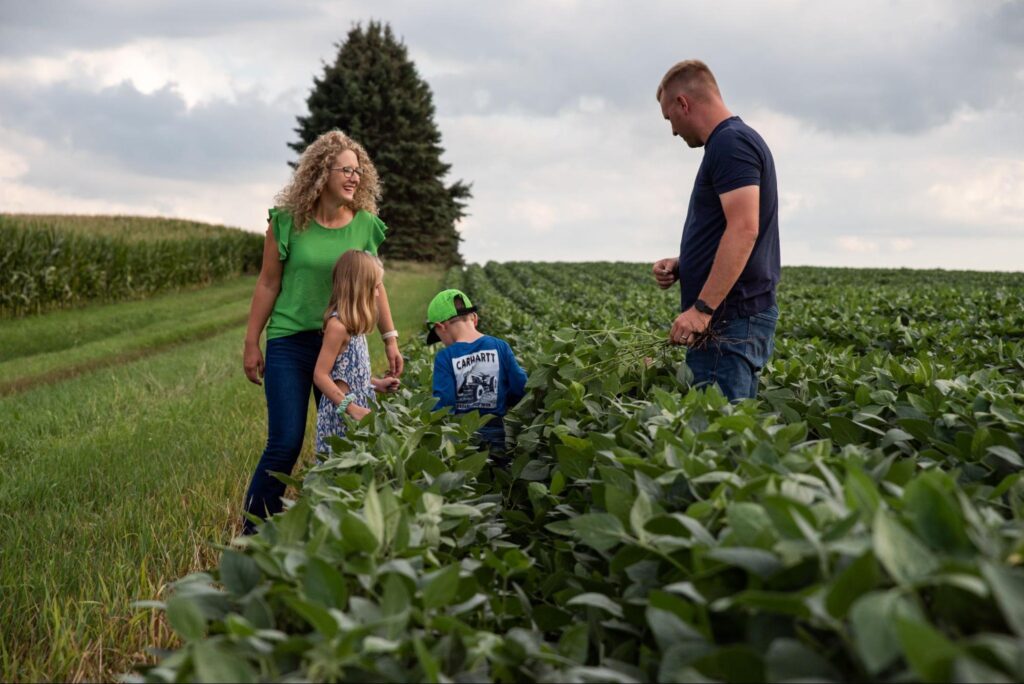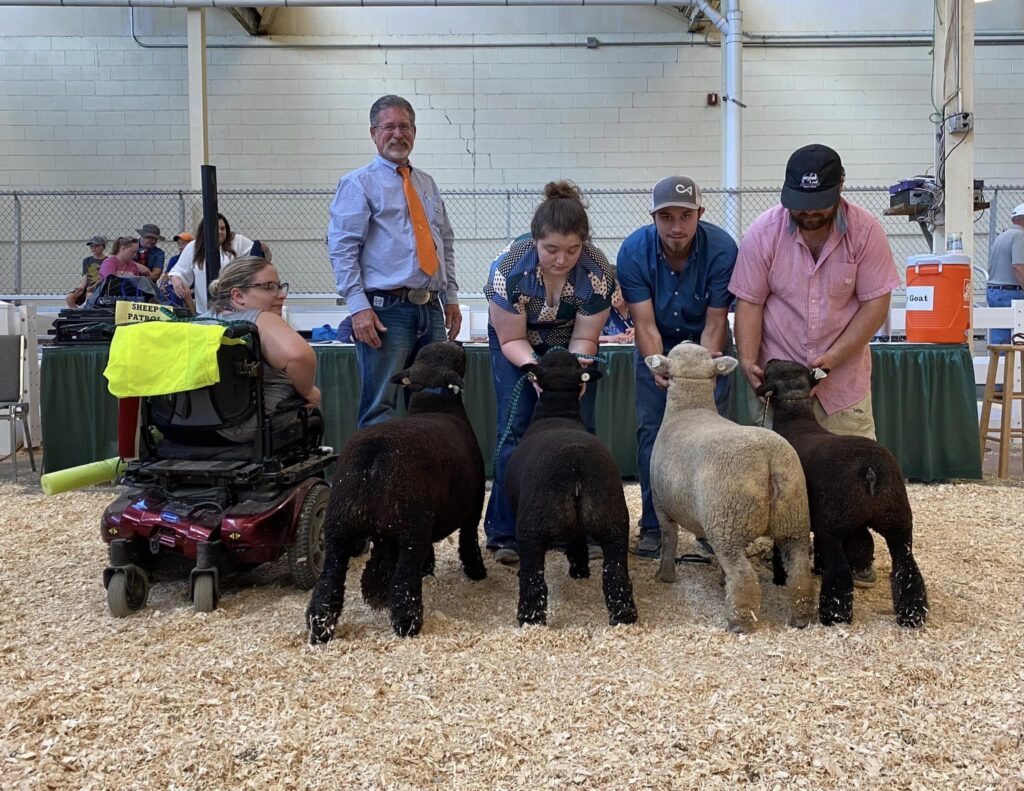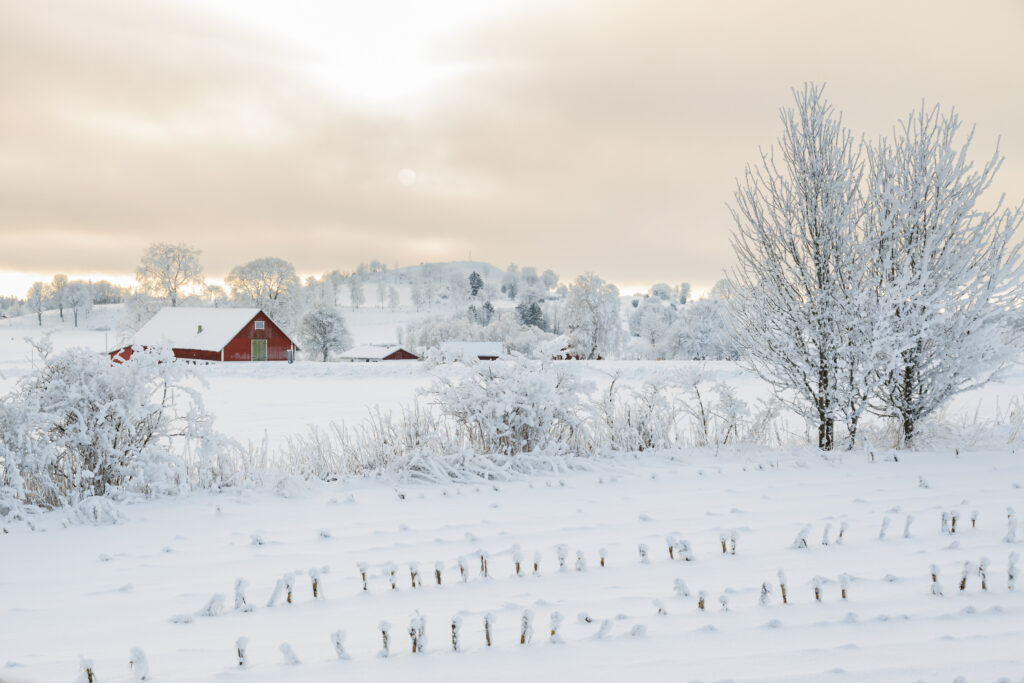Volunteer Insights
Meet Emily Ponwith
Where is your farm located?
Our farm is located near Cleveland, MN which is in south central Minnesota. Our closest ‘big’ towns are St. Peter and Mankato. I farm alongside my husband and our three children who are 7, 5, and 2.

What do you grow/raise on your farm?
We grow field corn, soybeans, contract finish hogs, and finish steers for direct to consumer beef sales. Our family has been farming in the Cleveland area since 1862. We are rooted in tradition and legacy, but also passionate about forward thinking, progressive decisions, and sustainability. Our family has been on a conservation tillage journey since the early 90’s and we are passionate about soil health. We implement a combination of no-till and strip tillage on our row crop farm. We are very proud of our soil and are honored to be stewards of the land.
How long have you been farming/how long have you or your family owned the farm?
I did not grow up on a farm. I was first introduced to this agricultural lifestyle that I now live when I was 18 and started dating my now husband. Almost everything I know is because I have learned from first hand experience and the opportunity to be included in our farming operation. Ryan and I began raising steers in 2016 as a stepping stone into farm income, we were both working full time off the farm at the time. In 2020 we purchased our first tillable acres and began raising our own crops. In 2021, my husband and I took over ownership of his family’s 6th generation farm that was first established in the Cleveland area in 1862.

Why is sharing information about agriculture and farming important to you?
There are real people with families and feelings growing and raising the food, fiber, and fuel our Nation and world need to survive and thrive. While farms may not all look the same or use similar production methods, our goal is the same: To provide a safe and sustainable product. At a time in history when there is a lot of noise around consumer trends, the voices of the agriculture industry are more important now than ever. We are here to answer your questions; we may even have similar questions! Conversations and connections matter!
What is something you wish more people knew about farming?
Farmers are professionals. We are not simple, nor is the equipment and technology needed to successfully complete our job each day. While we may prefer wide open spaces over skyscrapers, we appreciate the modern conveniences of life just like you. Many farmers are well educated and have skills outside of agriculture as well. Those skills come in handy when it comes to keeping up with advancements in technology and the continuous evolution of farming practices. Technology in agriculture isn’t scary. It is incredibly fascinating and ESSENTIAL for our farmers to continue to not only produce enough raw goods to keep our world moving, but also to continue to improve the health of our planet. We do not expect professionals in other industries to follow the same practices they did 50 years ago, so why do so many consumers and companies have that expectation or idealization of farmers? It is simply unrealistic, and we wish more would understand that if we are not trusted to do our job, there will be less food, less fiber, and less fuel for our growing population. Because of the 2% of Americans who are still farming, the other 98% of the population is able to use their skills and passions in other industries!
If you have kids, what is important for you to pass onto them about eating farm to fork?
Farm to Fork isn’t always as simple as it seems. Almost everything in agriculture requires multiple steps along the way. While we raise steers for beef production, we purchase them around 500# from another farmer. When it is time to be harvested, they are brought to a local meat market for processing and packaging before our customers pick their final product up. We do have three young children who very much understand that the animals we raise on our farm have a God given purpose to provide nutrient dense protein (and more) for human survival. The row crops we grow are used primarily for production of biofuels (ethanol and biodiesel) and are not food-grade, the ‘leftovers’ from that process are then used as livestock feed. Everything you eat was once part of a farm, while it might not be fresh from the farm like the sweetcorn you buy from a farmstand mid-July, or the strawberries you hand pick in early June; all of our food/food ingredients begin at the farm. While there is nothing better than farm fresh veggies, fruits, and proteins; having access to those things at a grocery store is just as incredible! If it is on your fork, it started on a farm.
What does each season on the farm look like for you?
Every season is a different kind of busy! While some may think row crop farmers like my family take the winters off, that is far from reality. Winter is actually one of our busiest seasons, the work is all just behind the scenes. The not-so-glamorous side of business ownership; things like tax prep, end of year book work, securing seed, fertilizer, and crop protection for the upcoming growing season. There are also a lot of meetings and professional development opportunities during the winter months.
The seasons of spring, summer, and fall bring about the growing season. We usually begin planting mid-late April and like to be finished by Mid-May. The summer months bring lots of crop scouting to be on the lookout for weeds, pests, and disease that can make our crop sick. September brings about harvest, which is the busiest and most intense season on the farm. The hours are long and by the end of it we are all exhausted. Bringing in the crop really tells the full story of the growing season and it is very rewarding to see the fruition of all your efforts.
Right now with the ages our children are at, my role is very supportive when it comes to outside work on the farm. I help care for the cattle, operate equipment as needed, prepare field meals, rural uber (give rides to different fields), and many other miscellaneous tasks. My primary role is caring for our children and taking care of the ‘invisible’ things that need to happen to keep a family and a farm moving.

What are ways our followers can support you and your farm throughout the year?
We often see and hear the phrase ‘Support Local Farmers’, but what does that really mean? Especially when it comes to farms like mine where our primary crops are not food grade so it’s not just as simple as purchasing food directly from a farmer. Support for farmers comes in the form of trust. Shopping at the grocery store is scary enough, hello rising food prices, being fearful of farming practices is not something you need to worry about!
Many farmers and farms are active on social media and want to connect with consumers in those spaces. You can find me sharing daily life from our farm on Instagram at @emilyponwith as well as at my website emilyponwith.com. Our farm is also on Facebook at Ponwith Farms.
Other ways you can support farmers:
– Fill up your vehicle with fuel, most has an ethanol blend.
– Go to the grocery store and purchase food for your family.
– Seek farmers out to understand agricultural practices.
– Visit a farmers market.
– Give farm equipment on the road space to drive safely.
– Purchase meat directly from a farmer.
– Visit a pumpkin patch or other agritourism location.
– Offer to deliver a field meal.
– Dig into your own family history and learn about your ancestors’ agricultural roots.
– Trust farmers as the professionals they are.
Follow CommonGround Minnesota on Facebook and Instagram.




